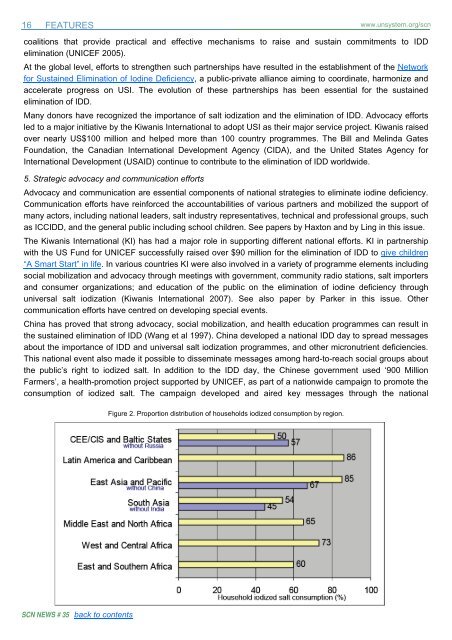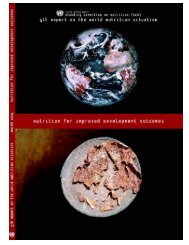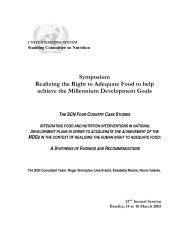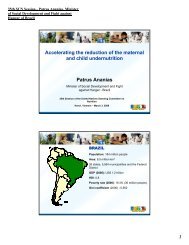Universal Salt Iodization (USI) - FTP Directory Listing
Universal Salt Iodization (USI) - FTP Directory Listing
Universal Salt Iodization (USI) - FTP Directory Listing
- No tags were found...
Create successful ePaper yourself
Turn your PDF publications into a flip-book with our unique Google optimized e-Paper software.
16FEATUREScoalitions that provide practical and effective mechanisms to raise and sustain commitments to IDDelimination (UNICEF 2005).At the global level, efforts to strengthen such partnerships have resulted in the establishment of the Networkfor Sustained Elimination of Iodine Deficiency, a public-private alliance aiming to coordinate, harmonize andaccelerate progress on <strong>USI</strong>. The evolution of these partnerships has been essential for the sustainedelimination of IDD.Many donors have recognized the importance of salt iodization and the elimination of IDD. Advocacy effortsled to a major initiative by the Kiwanis International to adopt <strong>USI</strong> as their major service project. Kiwanis raisedover nearly US$100 million and helped more than 100 country programmes. The Bill and Melinda GatesFoundation, the Canadian International Development Agency (CIDA), and the United States Agency forInternational Development (USAID) continue to contribute to the elimination of IDD worldwide.5. Strategic advocacy and communication effortsAdvocacy and communication are essential components of national strategies to eliminate iodine deficiency.Communication efforts have reinforced the accountabilities of various partners and mobilized the support ofmany actors, including national leaders, salt industry representatives, technical and professional groups, suchas ICCIDD, and the general public including school children. See papers by Haxton and by Ling in this issue.The Kiwanis International (KI) has had a major role in supporting different national efforts. KI in partnershipwith the US Fund for UNICEF successfully raised over $90 million for the elimination of IDD to give children“A Smart Start” in life. In various countries KI were also involved in a variety of programme elements includingsocial mobilization and advocacy through meetings with government, community radio stations, salt importersand consumer organizations; and education of the public on the elimination of iodine deficiency throughuniversal salt iodization (Kiwanis International 2007). See also paper by Parker in this issue. Othercommunication efforts have centred on developing special events.China has proved that strong advocacy, social mobilization, and health education programmes can result inthe sustained elimination of IDD (Wang et al 1997). China developed a national IDD day to spread messagesabout the importance of IDD and universal salt iodization programmes, and other micronutrient deficiencies.This national event also made it possible to disseminate messages among hard-to-reach social groups aboutthe public’s right to iodized salt. In addition to the IDD day, the Chinese government used ‘900 MillionFarmers’, a health-promotion project supported by UNICEF, as part of a nationwide campaign to promote theconsumption of iodized salt. The campaign developed and aired key messages through the nationalFigure 2. Proportion distribution of households iodized consumption by region.www.unsystem.org/scnSCN NEWS # 35 back to contents







